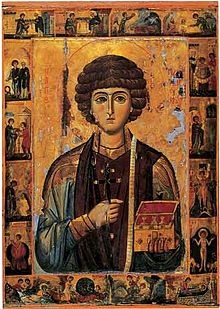
Martyr, died about 305. He was the son of a rich pagan, Eustorgius of Nicomedia, and had been instructed in Christianity by his Christian mother, Eubula. Afterwards he became estranged from Christianity. He studied medicine and became physician to the Emperor Maximinianus. He was won back to Christianity by the priest Hermolaus. Upon the death of his father he came into possession of a large fortune. Envious colleagues denounced him to the emperor during the Diocletian persecution. The emperor wished to save him and sought to persuade him to apostasy. Pantaleon, however, openly confessed his faith, and as proof that Christ is the true God, he healed a paralytic. Notwithstanding this, he was condemned to death by the emperor, who regarded the miracle as an exhibition of magic.
The fact of the martyrdom itself seems to be proved by a veneration for which there is early testimony, among others from Theodoret (Graecarum affectionum curatio, Sermo VIII, "De martyribus", in Migne, P.G., LXXXIII 1033), Procopius of Caesarea (De aedificiis Justiniani I, ix; V, ix), and the "Martyrologium Hieronymianum" (Acta SS., Nov., II, 1, 97). Pantaleon is venerated in the East as a great martyr and wonderworker. In the Middle Ages he came to be regarded as the patron saint of physicians and midwives, and became one of the fourteen guardian martyrs. From early times a phial containing some of his blood has been preserved at Constantinople. On the feast day of the saint the blood is said to become fluid and to bubble. Relics of the saint are to be found at St. Denis at Paris; his head is venerated at Lyons. His feast day is 27 July, also 28 July, and 18 February. edit.




